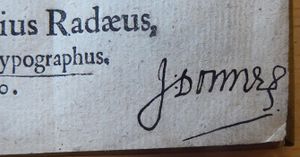Difference between revisions of "John Donne 1572-1631"
| Line 30: | Line 30: | ||
[[Category:Deans]] | [[Category:Deans]] | ||
[[Category:Clergy]] | [[Category:Clergy]] | ||
| + | [[Category:Members of Parliament]] | ||
[[Category:Illustrated]] | [[Category:Illustrated]] | ||
Revision as of 22:29, 6 July 2020
John DONNE 1572-1631
Biographical Note
Born in London, son of John Donne, ironmonger. Matriculated at Hart Hall, Oxford 1584, but did not graduate; he probably travelled in Europe for a while before entering Lincoln's Inn in 1591. He is thought to have been brought up as a Roman Catholic, but had converted to Anglicanism by the turn of the 17th century. He joined the expedition to Cadiz in 1596, and the following year became secretary to Sir Thomas Egerton. MP for Brackley, Northamptonshire 1601, the year in which his marriage to Ann More, opposed by her father, cost him his job; after travelling abroad again, the family settled at Mitcham in 1606. He spent some years thereafter seeking employment, while writing both verse (which he had begun to write in the 1590s) and prose, including doctrinal theological works opposing Roman Catholicism (Pseudo-martyr, 1610). In 1615 he was ordained and in 1616 he became vicar of Keyston, Huntingdonshire, Sevenoaks, Kent and reader in divinity at Lincoln's Inn; in 1621 he became Dean of St Paul's. He was celebrated in his own day as an author and a preacher, for both his verse and his prose.
Books
Donne acquired books throughout his life and directed in his will that they be sold, apart from a number on a (lost) schedule that should be given to friends. The dispersal did take place soon after his death and his books are now widely scattered across the world. Keynes's systematic effort to identify survivors, in the appendix to his Bibliography (see below) identified a little over 200, and many others have been found and reported since. There is a group of about 80 volumes in the Middle Temple Library, which formed part of Robert Ashley's bequest there in 1641. The books include many theological ones, as well as titles in classics, history, philosophy, medicine and other subjects.
Characteristic Markings
Donne regularly inscribed his books with his name, typically in the bottom right-hand corner of the titlepage, and his motto "Per Rachel ho servito, & non per Lea", a line from Petrarch which refers to the tension between the active and the contemplative life. He often annotated his books with small pencil marks in the margins. Keynes's observation that the plain limp parchment covers, which many of Donne's books have, reflect his "favourite form of binding" surely overlooks the point that such bindings were cheap, and probably all that Donne could afford during much of his life.
Sources
- Appx IV (Books from Donne’s library) in G. Keynes, A bibliography of Dr. John Donne, 4th ed, 1973.
- Adlington, H. Seven more books from the library of John Donne, The Book Collector 67 (2018), 528-33.
- Adlington, H. Close reader: John Donne’s Horace, Times Literary Supplement 20 January 2015, 14-15.
- Adlington, H. More books from the library of John Donne, The Book Collector 61 (2012), 55-64.
- Colclough, David. "Donne, John (1572–1631), poet and Church of England clergyman." Oxford Dictionary of National Biography.
- Hobbs, M. More books from the library of John Donne, The Book Collector 29 (1980), 590-2.
- Keynes, G. More books from the library of John Donne, The Book Collector 26 (1977), 29-35, and The Book Collector 27 (1978), 570-2.
- Whitlock, K. The Robert Ashley founding bequest to the Middle Temple Library and John Donne’s library, Sederi 14 (2004), 153-75.

